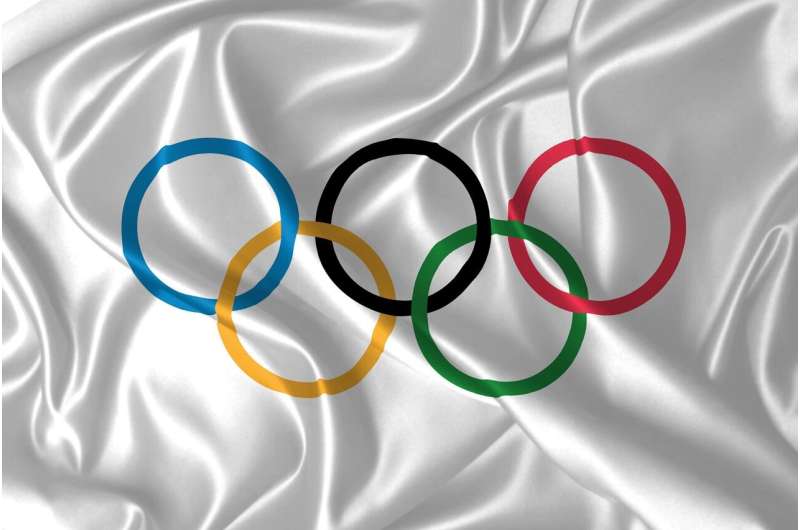This article has been reviewed according to Science X's editorial process and policies. Editors have highlighted the following attributes while ensuring the content's credibility:
fact-checked
trusted source
written by researcher(s)
proofread
Getting sick at the Olympics can seriously undermine podium chances—how athletes can avoid illness during the games

Athletes getting sick during the Olympics is surprisingly common. During the 2012, 2016 and 2020 Summer Games, between 4–7% of athletes suffered from some sort of illness. The 2018 Winter Games were no better with 9% of competitors suffering from an illness. Upper respiratory infections were the most common illnesses reported.
Getting sick during training periods is already bad enough for athletes. Research shows athletes who complete around 80% of their planned training weeks are seven times more likely to achieve their performance goals. For every week of incomplete training—perhaps because of illness—the chance of success is lowered by 26%. Staying illness-free both during training and at competition is an absolute priority.
Since medals are often won by the smallest of margins at the Olympics, even a mild cold could seriously impact a competitor's performance—and chances of getting on the podium. This is why it's so important that athletes do what they can to avoid getting sick during the games.
There are two main factors that can increase an athlete's susceptibility to getting sick: increased exposure to illness-causing bacteria and viruses and suppression of the immune system.
Traveling to the games, exploring the host city and mingling with the approximately 14,250 other athletes living in the Olympic village all provide ample opportunities for competitors to get sick.
At the same time, factors such as jet lag and the stress of competing can work against the immune system—making it less able to combat any pathogens it encounters.
The risk of illness may also be greater for certain athletes. Endurance athletes, for instance, are actually ten times more likely to fall ill compared to other types of athletes. This is probably due to the amount of training they do. Exercise spikes the hormone cortisol, which can suppress the immune system's function if these spikes happen repeatedly—such as during bouts of arduous training sessions before competition.
Female athletes, Paralympians, water-sport competitors and multi-event athletes are also at greater risk of illness.
Avoiding illness
Fortunately, there are many things athletes can do to avoid getting sick before competing for that gold medal. This includes:
- Taking care during long-haul flights: Long-haul air travel involves the re-circulation of cabin air, being in a confined space, having limited ventilation and being stuck near other people for a long period of time. All of these factors increase the risk of catching a cold. Wearing a mask and using antimicrobial nasal sprays may help limit this risk.
- Focusing on hygiene: The most common way an infection enters the body is via the eyes, nose, or mouth. Washing hands properly and often and avoiding touching the eyes and mouth may lower risk of illness.
- Avoiding crowds: As with any high-profile sporting events, the Olympics attracts huge amounts of spectators. With these large gatherings comes an increased exposure to potential bugs. Competitors may want to avoid large crowds until after they've competed if they don't want to get sick.
- Get a good night's rest: Athletes should aim for more than seven hours of sleep per night. People who only sleep around five to six hours per night are over four times more likely to catch a cold than those who get at least seven hours of sleep or more.
- Manage stress: Cortisol, a hormone that increases when the body is stressed, can suppress the function of our immune cells—making us more likely to catch a cold. Minimizing stress as much as possible before competing is crucial.
- Eat enough: It's vital athletes replenish the calories they're using up during competition. In the run up to the Rio 2016 Olympics, athletes who failed to consume back the calories they were burning during competition were four times more likely to report an upper respiratory illness. This is because our immune cells need energy to function properly. It's especially important athletes eat plenty of carbs and protein.
- Leave time to adjust: Athletes should allow at least seven days to adjust after long-haul travel to avoid jet lag-induced illnesses. One study found a quarter of the athletes who traveled by air from Australia to Hawaii for a competition experienced respiratory illness and chest infections on arrival. This coincided with an increase in fatigue and loss of sleep which are known to increase illness risk. It's advised that people add one recovery day for each time zone they cross.
- Adjust your training: In the run up to, and once at the games, athletes should replace long training sessions with shorter, more frequent ones. More than 90 minutes of high-intensity exercise can suppress the immune system due to the fact that it elevates cortisol.
- Take your supplements: So long as they're allowed, athletes should consume supplements to aid their immune system. Vitamin D, zinc and probiotics can all support immune health.
Ultimately, those who get sick don't win medals—so staying healthy before and during the competition period is key to an athlete's chances of success.
This article is republished from The Conversation under a Creative Commons license. Read the original article.![]()



















